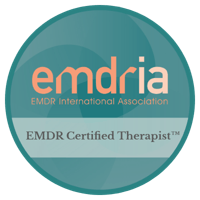Have you ever found yourself overreacting to a minor situation, only to wonder why you felt so emotional about it? Maybe someone’s tone of voice, a certain smell, or a specific situation made you feel intensely angry, anxious, or even shut down emotionally. These strong emotional reactions often stem from unresolved trauma and emotional triggers.
Triggers are not just random overreactions. They are the brain’s way of alerting us to unresolved pain from the past. The good news? You don’t have to be controlled by them. Eye Movement Desensitization and Reprocessing (EMDR) therapy is a powerful tool to help reprocess these emotional wounds so they no longer dictate your responses.
Let’s explore how trauma creates emotional triggers, why you react strongly to everyday situations, and how EMDR therapy can help you heal.
What Are Emotional Triggers?
An emotional trigger is anything that brings up a strong emotional reaction, often tied to unprocessed past trauma. These reactions can feel sudden, overwhelming, and out of proportion to the situation at hand.
Common Emotional Triggers
🔹 Feeling ignored or rejected
🔹 Being criticized or corrected
🔹 A particular smell, sound, or place
🔹 Seeing someone raise their voice or slam a door
🔹 Feeling pressured or controlled
🔹 Experiencing a sudden change in plans
🔹 Being left out of a conversation or event
These triggers stem from past experiences—often from childhood trauma—where similar situations made you feel unsafe, unloved, or powerless.
For example:
- If you were frequently criticized as a child, constructive feedback at work might feel like a personal attack.
- If you experienced emotional neglect, someone not responding to a text may feel like deep abandonment.
- If you lived in an unpredictable home, sudden changes in plans might cause intense anxiety.
The emotional intensity of these reactions comes from your brain still perceiving the present as if it were the past—as if you are still in that unsafe situation.
The Connection Between Trauma and Triggers
When a traumatic event happens, the brain stores the memory along with the emotions, sensations, and thoughts associated with it. Normally, our brain processes these experiences and files them away as “the past.”
However, when trauma remains unresolved, it stays “stuck” in the brain, and similar situations in the present can activate those past emotions as if they are happening right now.
This is why a small disagreement with a friend can feel as painful as past rejection, or why a raised voice can make you feel like a powerless child again.
How EMDR Can Help You Break Free from Emotional Triggers
Eye Movement Desensitization and Reprocessing (EMDR) is a scientifically proven therapy designed to help individuals reprocess painful memories so they no longer have emotional power over them.
How Does EMDR Work?
During EMDR therapy, you will:
✅ Identify your emotional triggers and their root cause in past trauma.
✅ Reprocess the traumatic memory using bilateral stimulation (eye movements, tapping, or auditory tones).
✅ Replace negative beliefs (“I am unworthy”) with healthier beliefs (“I am valuable and deserving of love”).
✅ Reduce the emotional intensity of past experiences.
✅ Respond to present situations with more balance and control instead of being emotionally hijacked.
What EMDR Therapy Looks Like in Action
Let’s say you have a strong emotional reaction to feeling ignored in a conversation. Through EMDR, you may uncover that this reaction is connected to childhood experiences of being neglected or feeling invisible.
Instead of continuing to react with anger, withdrawal, or fear, EMDR therapy helps you:
- Reprocess the original memory so it no longer feels painful.
- Understand that your present relationships are different from your past.
- Develop a healthier response that isn’t rooted in old wounds.

Breaking Free from Emotional Triggers is Possible
Your strong reactions to everyday situations are not a sign of weakness; they are clues to unresolved wounds that need healing. EMDR therapy helps you move forward so your past no longer controls your emotions, relationships, or sense of self.
Elnita Ottey is an EMDRIA-certified EMDR therapist offering both in-person and virtual sessions.
In-person therapy is available in Monroe, NC, and the Charlotte Metro area.
Virtual therapy is available to clients in Oregon, Oklahoma, Colorado, South Carolina, Tennessee, and North Carolina.
Looking for an EMDR-certified therapist in your area? Visit www.emdria.org to find a qualified professional near you.
Are you ready to stop being controlled by emotional triggers and reclaim your peace? Contact Elnita Ottey today to begin your healing journey. You deserve to feel safe, calm, and in control.








